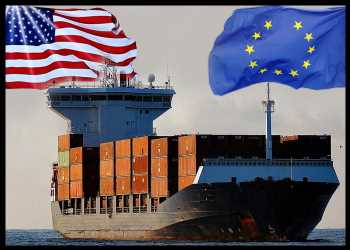The inaugural meeting of the EU-U.S. Trade and Technology Council has established common principles to update the rules of the road for a 21st century economy that deliver for the people of the two continents.
Launched at the U.S.-EU Summit in June, the Trade and Technology Council held its inaugural meeting in Pittsburgh, Pennsylvania on Wednesday. U.S. Co-Chairs, Secretary of State Antony Blinken, Secretary of Commerce Gina Raimondo, and United States Trade Representative Katherine Tai, were joined by EU Co-Chairs European Commission Executive Vice Presidents Margrethe Vestager and Valdis Dombrovskis in the meeting.
At the meeting, the United States and European Union decided to closely coordinate on an expansive set of critical economic and technology issues over the coming months.
The two entities agreed to strengthen their competitiveness and technological leadership by developing common strategies to mitigate the impact of non-market, trade distortive practices at home and in third countries.
“The United States and the European Union reaffirm the TTC’s objectives to coordinate approaches to key global technology, economic, and trade issues; and to deepen transatlantic trade and economic relations, basing policies on shared democratic values,” the Council said in a joint statement issued after the meeting.
“The United States and European Union will enhance cooperation on measures to advance transparency and communication in the semiconductor supply chain and identify gaps, shared vulnerabilities, and opportunities to strengthen our domestic semiconductor R&D and manufacturing ecosystems with a view to improving resilience in the semiconductor supply chain,” the White House said in a statement.
The United States and European Union will develop and implement AI systems that are innovative and trustworthy and explore cooperation on AI technologies designed to enhance privacy protections.
The two entities intend to exchange information on investment trends affecting security. The two sides also determined shared principles and areas for export control cooperation.
The TTC co-chairs tasked various working groups with developing work plans to strengthen mutual cooperation on additional critical areas. This includes prompting small- and medium-sized enterprises’ (SMEs) access to digital tools, securing critical supply chains, cooperating on emerging technology standards, advancing climate and clean tech objectives, data governance and technology platforms, information and communications technology security and competitiveness, and the misuse of technology threatening security and human rights.
The White House added that the inaugural TTC included a meeting with a broad range of stakeholders. The Council decided to continue robust engagement with a diverse range of stakeholders, including industry, labor organizations, think tanks, non-profit organizations, environmental constituencies, academics, and other civil society members.
TTC was established during the U.S.-EU Summit in June by U.S. President Joe Biden and European Commission President Ursula von der Leyen to expand and deepen trade and transatlantic investment ties and update the rules of the road for the 21st century economy.
U.S. goods and services trade with the European bloc totaled an estimated $1.1 trillion in 2019.
In 2020, the United States was the largest partner for EU exports of goods and the second largest partner for EU imports of goods.
In August last year, the United States and the EU had agreed to a package of tariff reductions that will increase market access for hundreds of millions of dollars in U.S. and EU exports.
Source: Read Full Article
